Memories of Dredmor, part 3a
Part 2, "Developing Dungeons of Dredmor", can be found here.
As usual, let me preface this by stating that my goal is to tell my story of Gaslamp, not Gaslamp's story, and by doing so work through what it all means to me now. My perspective is necessarily subjective, personal, and prone to error.
(They'll be less egregious in this section, however, because documentation of Gaslamp post-Dredmor is fairly good!)
Why The Delay & Hedging
So I've been busy. Plague, chaos, etc. Sure thing.
Apart from that, the post-Dredmor launch period is that it was a time that I felt the most satisfied, successful, and happy at Gaslamp Games. I've found it difficult to think back over those times because of the negative emotions that came later, during the death march mid- and late-stage development of Clockwork Empires followed by the final sodden thwump of Gaslamp Games coming to an end. I focused my remembering on those negative emotions because I wanted to be very sure that I never made the mistake of getting into a similar situation ever again.
Maybe what I'm describing is a normal response to emotional trauma and burnout. Or whatever. Certainly I didn't begin this writing series with the expectation that I'd be revisiting the dark side of my 201X's indie game dev experience, but it turns out that making Dredmor and making Clockwork Empires are inextricably mixed stories.
Let me preface this then, for what it's worth, by observing that we three Gaslamp partners were all younger and stupider men during these events. Ten years have passed. I can't speak for the others, but I would speculate that they also feel like they've made mistakes and learned from them. So: let my observations about myself and others not be taken as a condemnation of these people for who they are in the present day.
(... Boy, that sounded heavy. It's really not that bad. I just want to be really clear that I'm trying to honestly reflect upon mistakes rather than write a hit-piece.)
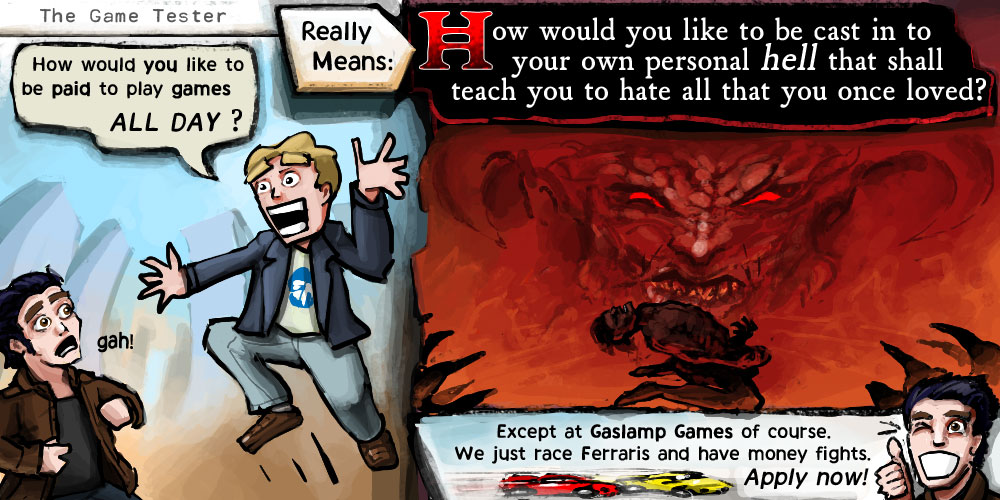
An ironic comic I drew for a blogpost during the early Dredmor days.
Timeline of Gaslamp Games
These were heady times! To make sense of them I think we need to go over the timeline of events post-Dredmor launch.
- 2011 July 13: Dungeons of Dredmor released
- 2011 August: discussions to decide on "the next game"
- 2011 September (ish): prepared the funding application for Project Odin (Clockwork Empires)
- 2011 December 14: released expansion #1, Realm of the Diggle Gods
- 2012 March: "official" start of development on Project Odin (Clockwork Empires)
- 2012 June 5: released expansion #2, You Have To Name The Expansion Pack
- 2012 August 1: released expansion #3, Conquest of the Wizardlands
- 2012 August 30: attended PAX 2012
- (after): development of Clockwork Empires (not the subject of this writing!)
- 2016 November 30: last day of operation of Gaslamp Games, Inc.
I think may be striking to someone on the outside of these events is just how early we were planning to make Clockwork Empires as our "real" game, and how short a time the golden year-and-change is which produced everything to do with post-launch Dungeons of Dredmor.
Let's tackle this in chronological order. I'm also going to split part 3 into two posts. Part A will get us up to PAX 2012, then part B will tackle how Dredmor for iPad wasn't, a short piece on the end of Gaslamp Games, and general reflections upon the whole experience.
2011 July - Dredmor Launch Party
We held our launch party in Victoria, BC within a couple weeks of going live. Pretty much everyone involved still lived on Vancouver Island: Nicholas, Daniel, respective life partners, and Business Chris. Web Guy Derek, and Music Mathew also came over from Washington state to help celebrate.
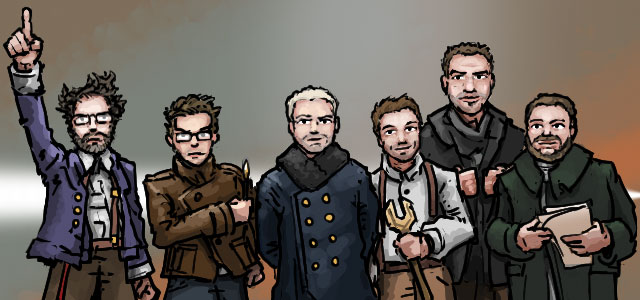
From left to right: Nicholas, David, Daniel, (Web Guy) Derek, (Business) Chris, (Music) Matthew
We had not received our first payment from Valve at this point, so I was still feeling the crunch of expenses. My respective life partner and I ferried over from Vancouver, crammed into the bus on the hour-long ride to and from the ferry terminals.
The next day we started with pitchers of unusually strong cidre at the Bent Mast pub, just a couple blocks from where I lived when I started working with the team that would become Gaslamp Games. Later, we moved the party to some cocktail bar downtown. Nicholas allegedly knew the bartender. I remember having absinthe and hating it. In the due course of events we got fairly drunk and attempted to smoke some Cuban cigars that someone had picked up. Then, for some reason, it was decided that we ought to walk over to Daniel's apartment "nearby" to keep the party going.
... A mile and a half later, shivering and cold, we got to Daniel's apartment only for my partner and I to immediately take a cab back to the hotel because we were extremely tired. I felt completely terrible for much of the next day. It wasn't the most hungover I've ever been, but it was up there. The cigars were not a good idea.
(A couple years later, as a funding requirement for Clockwork Empires, we had to get life insurance for the three core partners. During the interview portion I was asked if I'd ever smoked, so for fun I told an even shorter version of this anecdote. The insurance man was very nice and said in his most courtroom-approved voice that I should perhaps reconsider my answer. I got the hint and said "No, I have never smoked in my life.")
* * *
As I've explained in previous sections Nicholas, Daniel, and I did not get into this thing as friends. We were business partners and colleagues first, with whatever degree of friendship following after. We did have fun, of course; that much is obvious in Dredmor. And the nerd stuff and humour aside, what we all bonded over most was good food and drink. Whenever Gaslamp threw a party or event, or was entertaining business contacts, we'd always put in the effort to find a nice restaurant and make sure everyone had a good time.
I recall once that Business Chris - who had a lot more experience in tech than any of us - said that Gaslamp always had the best parties. That'd have been the time that the bartender, possibly lying, said that they were all out of mint because we ordered too many mint juleps. (This was at Revel Room in Vancouver, the launch party for one of the expansions.)
I feel the need to emphasize that this wasn't a matter of snobbishness (not entirely), nor a matter of having more money than sense (though this was also true, for a time). If you've already got a business, if you're already buying food - or supplying the office with furniture, coffee, workstations, whatever - it really doesn't cost that much more per person to just get the nice stuff. It tells people that you value their comfort and thus their part in the shared endeavour. Gaslamp as an entity was always good about this.
As I write this, I'm still sitting in the same absurd office chair that Gaslamp bought for me.
2011 August - The Next Game (A Fateful Decision)
I've told this story before, but it's important enough to do it again.
We three Gaslamp partners talked about what we wanted to do next. Remember, Dredmor was only ever the thing we were finishing off to make money to make the real game. The ideas in the air were the themes we'd already explored - fantasy, steampunk, strategy of some kind. Though that said, I know for sure that I was not eager to return to Clockwork Fantasia. That was a more wholly Nicholas-driven project, though Daniel shared his love for strange tactical JRPGs.
After hashing through various proposals - including a quick mobile remake of the game Sherlock which Nicholas' father and my mother were both huge fans of - the two prime candidates came down to "Remake of Master of Magic" or "Dwarf Fortress But Steampunk".
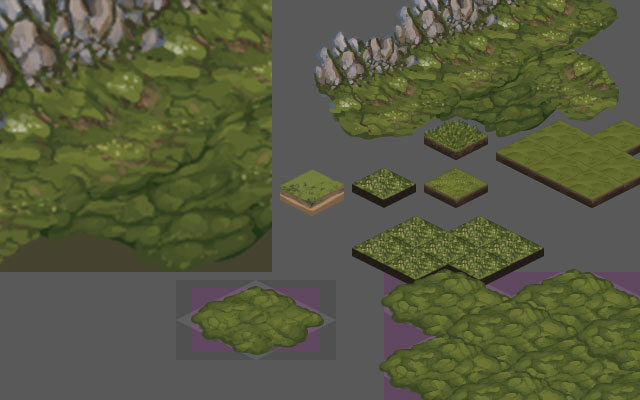
A painted terrain mockup for the Master of Magic remake proposal. Looking back, there's clear continuity between this line of artistic thought and the generic terrain sets I'd start selling online in 2015-2016.
I voted for remaking Master of Magic. Ideally it'd be a 2D game because that was within our proven technical abilities and, most of all, because it fit my own skillset. Nicholas and Daniel voted for Steampunk Dwarf Fortress and were into the idea of making a 3D game with the engine that was used for Clockwork Fantasia.
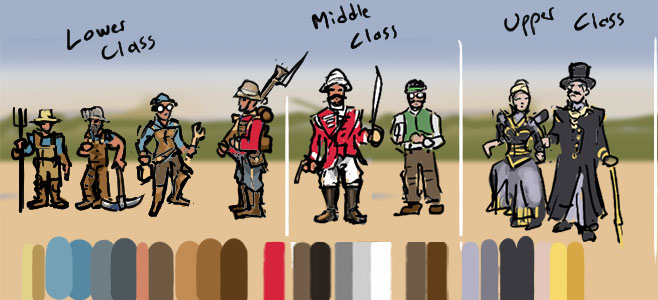
One of my first sketches, found in a folder called "Steam Fortress", showing costume colour corresponding to social class.
I did not have the faith in Nicholas' 3D engine that the others did, and only partly because I didn't want to make a 3D game. Let me concede now that it is impressive for one person to build such a thing more-or-less from scratch. But. It was still pretty much just three things 1. the failed Clockwork Fantasia project, 2. a testbed for Nicholas' academic graphics tech demos, and 3. an underbaked UI library. The asset pipeline was nearly unusably crude and fundamental boring-but-important features were severely underdeveloped. For instance, there was never a feature-complete text entry widget even when Clockwork Empires wrapped development in 2016.
I could point to the decision to make Clockwork Empires as that which sealed Gaslamp's fate. But that's too simple: it wasn't so much this one decision, or that Nicholas' engine "was bad" (though let us now invoke the now-traditional game dev wisdom of "make an engine or a game, because you can't do both"). The fault was the fact that a decision like this could be made, and then once made, we did not have the wherewithal to correct or otherwise ameliorate the problems and missed deadlines that rapidly cropped up.
It was the inability to course-correct after making a business decision which went poorly that sealed Gaslamp's fate. If we'd cut the project before the public announcement, when it was obvious that development was way behind the proposed schedule, we'd have lost two years of development and maybe a few hundred thousand dollars. But we'd have been fine as a business. But no, we fell into the sunk cost falacy, and could not admit defeat.
We're not quite there in the story yet, however.
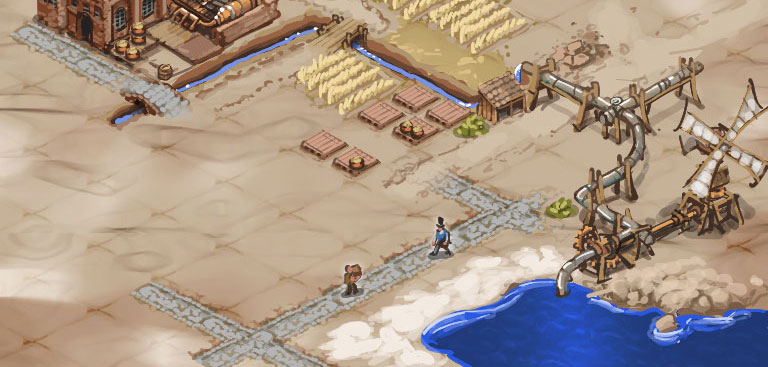
One of my first concepts for "Project Odin". The Impressions citybuilder influence should be obvious.
* * *
It's as good a time as any to discuss counterfactuals.
Unity, as in the game engine, did in fact exist at this point in time. But 2011-2012 was a different age of game development: Unity had not cemented its reputation as an obvious solution at that point - just a year or two after, it would. Nor had Unreal. I also don't think Nicholas' personal goals surrounding his academic career would have found the use of an outside engine acceptable. His goal was to be able to both make a game engine and use it as a means to achieve his degree work.
(Having recently read about the process of gaining an advanced degree and the ancillary work involved, I can say now that this was not a good plan from a standpoint of reasonable personal time management. I'm sure Nicholas would agree, in hindsight.)
Maybe there could have been a way that Nicholas could have pursued his academic interest within the framework of another engine such as Unity or Unreal. We could get all the boring boilerplate and Nicholas could make his tech demos. Unlikely though. Lots of sunk cost and emotional attachment to the Clockwork Fantasia engine.
Alternatively, someone puts their foot down hard enough that they or another person walks. Imagine if I said I wouldn't go forward with a 3D game, not ever.
I could become a silent partner, though I'd hate that. I could get bought out for somewhere under a third of the company value (looking back, this would have been a smart move). Alternatively, Nicholas walks. But then, it was "his" Dredmor engine and IP that would be owned by Gaslamp. And my impression was always that he felt a somewhat closer attachment to the Dredmor project than either Daniel or myself, so I don't think that would have been an option.
Anyway, these hypothetical scenarios were hardly teetering on a knife's edge.
None of us were interested in escalating matters to the degree of dissolution; it was unthinkable considering how high we all were riding on the successes of Dredmor - this should be obvious by the end of this post.
It wasn't simply a matter of Nicholas being egotistical about using his own engine; we were all egotistical about our success, and everyone who saw our success fed that. We had more money coming in than any of us had ever seen before. We believed that Gaslamp Games could accomplish any heights through our audacious energy and determination. The specifics of how to do that? Mere details. This also made it easy for me to compromise: so what, I didn't get my way this time. We'd wrap up Clockwork Empires in a year or two, by 2014, then move on to the next project. Then I could argue stronger for something I was more interested in based on being a good sport about doing Clockwork Empires.
So we aimed high. I had my doubts. (And all those doubts came to pass! I was right! So there! Ahem.) But I believed more in Gaslamp than in my doubts, and I believed in being a Good Team Player.
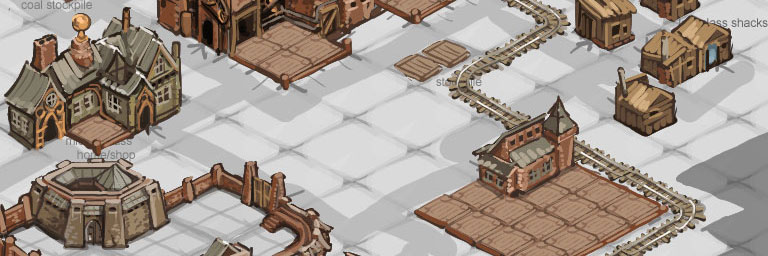
Another early concept for "Project Odin" with a focus on buildings and various conduits between them.
2011, September, applying for funding for Clockwork Empires
Around this time I was working out of a crappy office sublet from my Respective Life Partner's small graphic design company. It was possibly the cheapest and perhaps the worst office in Vancouver's Yaletown neighborhood which is otherwise known for yoga studios, trendy restaurants, and overpriced condos. The space consisted of two levels in an old boiler room which still has a couple of the only smokestacks remaining from the areas' industrial heritage.
If you stood in the right spot and looked up at where the internal portion of the smokestack hit the ceiling, you could see a little spot of blue daylight. It got terribly, terribly cold in the winter.
Anyway, I worked out of there for a while. Then Nicholas took over the desk next to me when he moved to Vancouver. (At some point he bought an old Hammond organ and left it in the loading bay, which prompted an email to all the tenants from the building owner demanding that the loading bay be cleared due to the fire hazard, "there's a pile of junk in the way, including a Hammond organ". Nicholas never did move the organ; the building owner presumably sold it.)
Daniel would remain in Victoria for another couple years, and would ship over to Vancouver fairly often for meetings.
It was in this office that we made the first Dredmor expansion pack and finalized the first plan for Project Odin which would become Clockwork Empires. In hindsight, I would describe that plan as somewhat half-baked.
* * *
To assist with our funding application we paid an outside consulting company a few thousand dollars. The thought was we had the money, we know nothing about how to do this, so let's make sure we line everything up to really nail this application.
Frankly, they did a bad job. The writing quality was poor, the statements they wrote were often contradictory, occasionally nonsensical, and filled with hyperbole about how we'd come up with brilliant technologies and an amazing game that would change everything while making boatloads of money. It was a load of shit.
This application was approved -- apparently with one of the highest scores given by the funding reviewers.
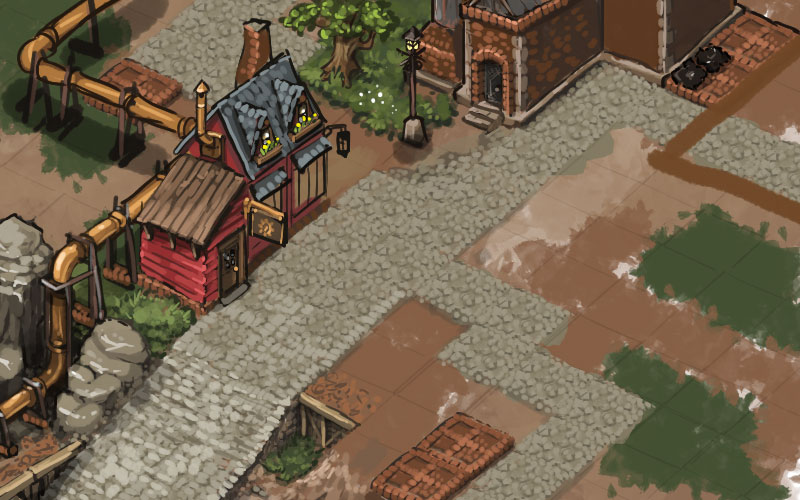
An early concept for "Project Odin", a closer view of the map to emphasize characters, before building interiors were planned.
What's the lesson here? I can't help but look back and become a bit cynical about this media funding process in Canada. Or maybe I should be forgiving; maybe we're good liars? Or maybe this was Of The Time - these people were used to funding small movies and television productions. Their paperwork and process reflected this, and let me tell you, it required a lot of fudging to fit a video game production into the organizational framework of a film production.
... Maybe it takes very, very little for a pack of 20-something white guys to blow some hot air and get people to invest money in their risky tech boondoggle. I mean, the plan was a good one when understood on its own terms if everything went exactly as described in the pitch. Parts of it did work. Gaslamp really did hit a huge wave of public support when the project was publically announced in 2014, and considering the state of the genre at the time, if production had been on schedule to take advantage another fortuitous conflux of events, it could have been another home run.
How could we be so blinkered as to think it'd be that easy? Well, let me tell you about the three expansion packs we made for Dungeons of Dredmor.
2011, Fall - expasion pack #1: Realm of the Diggle Gods
Although we wanted to move to developing a new game, it felt like not making at least one expansion for Dredmor would be leaving easy money on the table. We were riding a wave of great publicity and primed to produce more content for Dredmor. The engine and gameplay were done, we just had to add to it.
Plus we had money now! Nicholas brought in a couple of his friends as contract coders - another guy also confusingly named Nicholas in particular worked on expanding the room scripting, which was a delight. I brought in Aura as an animator and backup environmental sprite artist - more on that in a moment. I also found a video artist, Ian, to help us make a real launch video, and it turned out wonderfully. Matthew made more sounds, of course. For content, we pretty much picked up where we left off; there were lots of ideas cut from the original release, and it was an easy matter to drink lots of coffee and joke about what stupid thing we could implement next.
There's nowhere to go but down! Dig deeper and more greedily! Obviously the way to expand Dredmor was to add more dungeon levels.
This was actually kinda dumb, in hindsight. Let me explain.
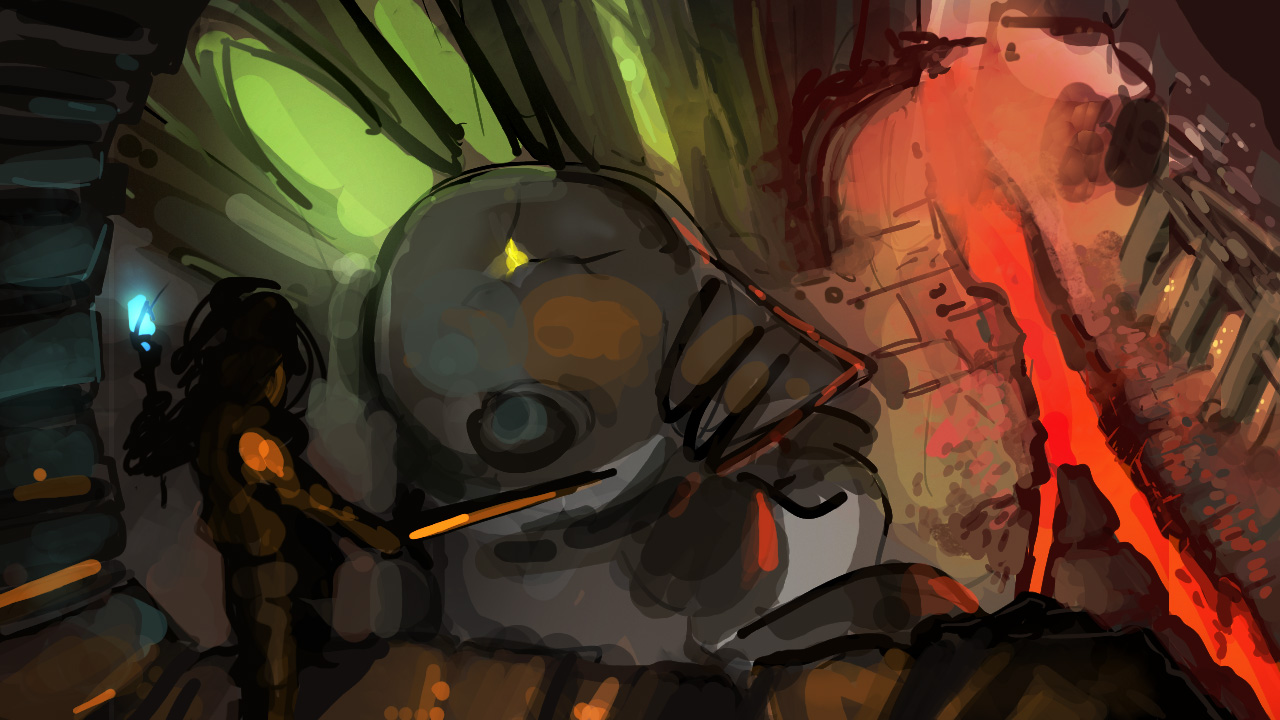
Early sketch for the Realm of the Diggle Gods title screen. The one we shipped with was slightly inept; I like this composition better.
The thing about video games is most people only play the first little bit. Dredmor provided us with some statistics about player activity via Steam achievements and what we saw was that a majority of players only got to level 2 or 3 of the dungeon out of a total of 10. So if you're going to make an expansion that most players will enjoy, you've got to add something that's visible within the first few hours of gameplay. Putting all the new dungeon levels after the main game - which only hardcore players got to - means that our core value proposition for most players was not great.
(We applied this lesson for the second and third expansions and made sure the new content was intermeshed with the entire rest of the game.)
* * *
On the other hand, adding the Female Hero was a great move.
We wanted to add a female hero character before, but uh, I wasn't going to animate it for reasons covered in earlier entries of this series. So I needed to find someone else to do this work for me.
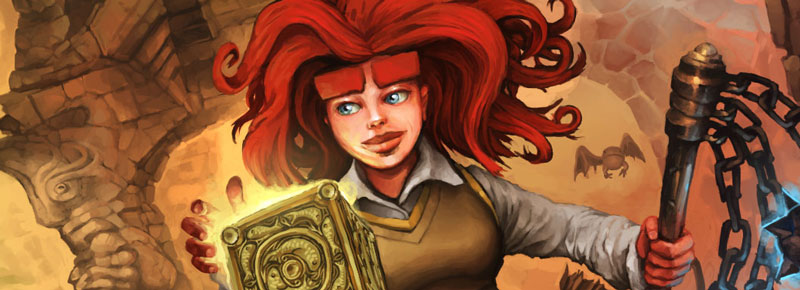
Game freelancers are funny. Probably it's the same for all freelancers, but in my experience maybe half to 3/4ths of the random low-experience online contractors don't work out at all. Freelancers are freelancers for a reason. What that reason is, perhaps, determines much about how that contract is going to go. Certainly the game dev school pipeline outputs more graduates than jobs, so students try to find some work in the meantime. Maybe they juggle that with a day job. Maybe they never went to school at all and are trying to break into the industry directly. Maybe their life situation just means they can't hold a full-time job. Maybe they're just weird, like me, and don't want a regular job if they can help it. There are potential pitfalls all around.

Anyway, I found four animators. Three of them had problems ranging from "not good at animating" to "taking forever to do the work", but one was absolutely fantastic: Aura Triolo. She made a fan animation of a diggle doing a weird walk, we saw that posted somewhere, and asked "Can you do more like that? Like, a lot more?". We'd go on to hire Aura to work on Clockwork Empires and her contributions are some of the most outstanding work in that game.
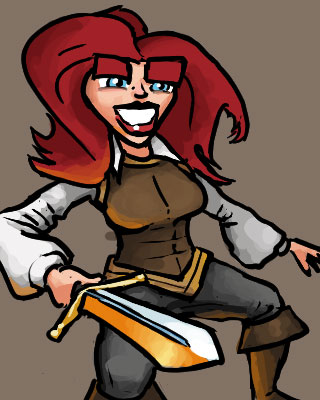
We got lots of new animations. They were super charming. But we needed more, and faster. Problem was, Aura had a day job at Staples that was interfering with her ability to do work on Dredmor. So one day I was like, okay, how much does Staples pay you in a month? If we can guarantee that we'll pay you more per month than Staples can you dedicate your time to us instead?
Staples does not pay employees well, so we went ahead and did that.
Back to the female hero: She had to have an identity as more than just a gender-swap of the current hero, who had a bit of his own personality that came through in the ancillary art for skills and leveling and so on. I felt like the female hero was a bit more competent, but also a bit more deranged and prone to getting dangerously enthusiastic about whatever she put her mind to. I think this carries across in the art.
(Oh, yeah. I guess I should mention that she was also kinda-sorta based off a drawing I did for and of my Respective Life Partner, see above and to the left. She's very proud of being put into Dredmor, especially after her cheese contribution.)
I should add: women loved the addition of the female hero. We got tons of emails and forum posts thanking us for putting in a hero that they could be, a character unto herself, rather than one that was obviously designed as an archetype to be looked at by dudes who didn't go outside much. I do think a big part of Dredmor's success is owed to breaking out of the mold of the dick-swinging grimhard sweaty basement fantasy RPG.
... Which is legitimately kinda-sorta where we came from, one must admit. And what our inspirations were. But it turned into something that didn't aggressively put-off anyone who didn't live there all the time, and that made all the difference. A lot of people want to be a little bit of a sweaty nerd, sometimes. Even and especially women who play games.
2011 December: launching Realm of the Diggle Gods
We really flew by the seat of our pants in those days. For instance I'd never condone putting a build together literally the day before launch, but you know.
I remember just a day before we had to submit our build, we were putting the finishing touches on everything in our janky office in Yaletown. I had to get the art done because I was about to go on a trip to Las Vegas with my Respective Life Partner, and I had made the mistake of drinking a beer in a slightly premature celebration of finishing the art. To make up for this, I drank a bunch of coffee. Between the two, I was all over the place, but did manage to pull through and finish the (slightly weird) art. Nicholas kept the coffee machine going, and pulled the build together to get to testers over the weekend.
A few days later, in Las Vegas, I remember sitting in an armchair in our hotel room and opening up my laptop to have a look at our launch sales. There was a glass of JD & coke on the table.
The game had made over $100k in a single day. I closed the laptop and finished my drink.
Gaslamp hit the jackpot - again. It was unreal. And very Las Vegas.
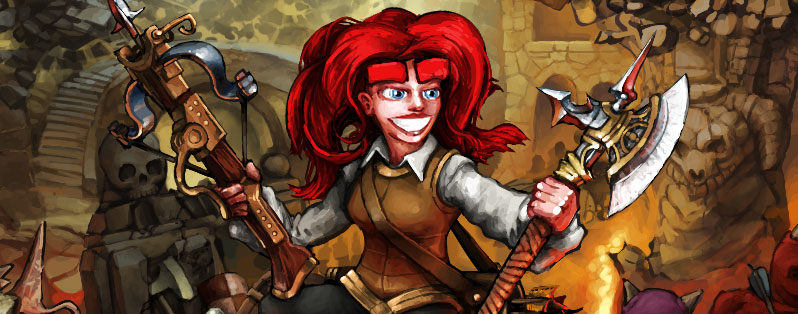
2012 March: the "official" start of Project Odin
I won't get too deep into this. It was an awkward time because according to our funding schedule, we had to get started on Project Odin aka Clockwork Empires. (Why did we call it "Project Odin"? Because it sounded cool. That's it.)
-- But we still had a bunch of stuff in the pipe for Dungeons of Dredmor. Theoretically, this is fine. Any responsibly planned game project needs a good deal of ramp-up time to do preproduction. We needed to build a team of employees, and in particular Nicholas needed some time to get the engine ramped up into something resembling a game.
With less Nicholas Time for Dredmor, we offloaded more Dredmor feature coding onto contractors, picking up Code Chris to do the heavy lifting for the third expansion (who IIRC both Nicholas and Daniel knew from the University of Victoria), and he would end up joining us for a couple periods of Clockwork Empires development. Nicholas #2 might have done some more work for us, as well, before moving to Mozilla full time.
In the meantime, I had to build a 3D art team for Clockwork Empires (more on this in the next piece). Seeing as how I wouldn't be doing 3D art myself, I surely had time to put into getting some more Dredmor expansions moving along. So, what to do?
We look back to Valve. Our contact there was making noise about a new feature for Steam, the "Steam Workshop" which would integrate mod support for games into the Steam platform. Because we were such good sports about helping them populate their MacOS and Linux catalog when they had a need there, maybe we'd be good enough to help them by being among the first games to support the Steam Workshop.
We knew where the money comes from, we know the hand that feeds. If you work with Valve, you get featured. If you get featured, you get a huge boost in sales.
We were in.
How about a free mod-themed mini-expansion pack to launch with the Steam Workshop feature? Brilliant.
2012 June: expansion #2, You Have To Name The Expansion Pack
In the Starsector modding forums I often hear players - not modders - ask if a mod could be rolled into the game itself. There are good reasons why this is, as a rule, a bad idea and I'd recommend against it. It worked out well enough for Dredmor in this case, but it does "kill" the mods in question.
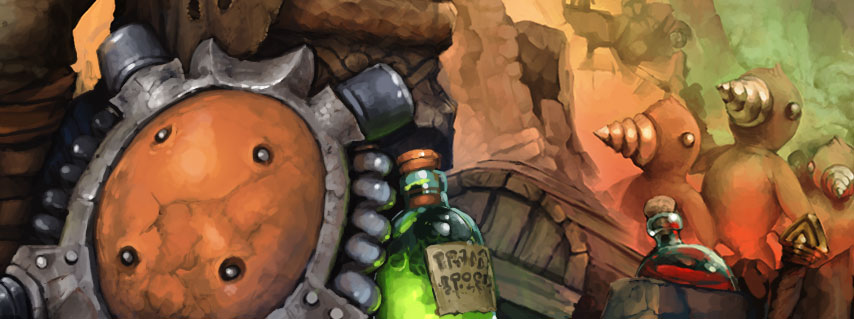
Detailed crop from the title screen I painted for You Have To Name The Expansion Pack, which was really just a modified version of a title screen I did as a promotion for a PC Gamer article on Dredmor. Yup, lots of double-dipping content.
Let me explain what "You Have To Name The Expansion Pack" was before I get too far into that.
First, an aside: the name of the expansion pack being "You Have To Name The Expansion Pack", confused our contacts at Valve Software to hilarious ends ala Who's On First.
GLG: "Yes, we'd like to add an expansion pack called You Have To Name The Expansion Pack."
V: "Cool. What's the name of the expansion pack?"
GLG: "'You Have To Name The Expansion Pack.'"
V: "... But what's the name of the expansion pack? We need a title for the product."
(Everyone figured it out eventually.)
I maintain to this day that it was a wonderful meta-title. The best part was, you could click on the title in-game to enter your own title for the expansion pack, thereby fulfilling the command given by the title.
* * *
We contacted modders who had made five of the best (and most setting-compatible) skill mods and asked if they'd like to sell us the rights to their mod for a Digglebuck (a defaced US one dollar bill with George Washington wearing a diggle nose). I would redraw the art to match the canonical Dredmor style and do an editing pass on the writing, then Gaslamp would put this together as an expansion pack along with a few other goodies- a handful of new random rooms, items, etc. and it'd be released for no charge.
This all went reasonably well despite our crude Dropbox-based collaboration system. And some of the modders involved didn't quite see eye to eye on... anything. But only I really had to coordinate content with them directly, so with a bit of diplomacy and stove-piping it was all sorted out. The small scope of assets required from modders was really what made this possible: Modding Dredmor is very easy and requires only a text editor, and maybe some pixel art if you are so inclined.
The thing is, like I said, this does "kill" the mods that we took in.
By kill I mean that the mods could no longer be updated and expanded upon by their original authors. Once Gaslamp Games took them on, the company itself became responsible for quality assurance and any possible future updates and fixes. One supposes we could hire the modders on a contract basis, or work out some kind of deal, but... this was a free expansion. The point wasn't to make (and spend) money; it was to promote the idea of modding Dredmor and have some fun (while part of our attention was focused on trying to get Clockwork Empires started).
(Regarding that: we did have the notion to do a third expansion by this point. The contracted coders were working on features, and I was creating art. We'd also submitted our application for funding for Clockwork Empires in very early 2012, and been approved. I remember Daniel emphasizing that we really had to get going on Clockwork Empires; not the least because we were contractually obligated to.)
This one was another easy success with just a month or two of work. Despite being priced at all of zero dollars, we got our attention from Valve, so it did significantly boost sales of Dungeons of Dredmor and Realm of the Diggle Gods.
* * *
Now with all of that said ... I would never do this again. I don't think it's ethical to take people's free labour on mods like this and use it, even indirectly, to promote private business profits. The correct way to do this would be to pay the modders as the actual content creators that they are. We could have afforded to throw at least a few hundred bucks at these people; they earned Gaslamp that and more.
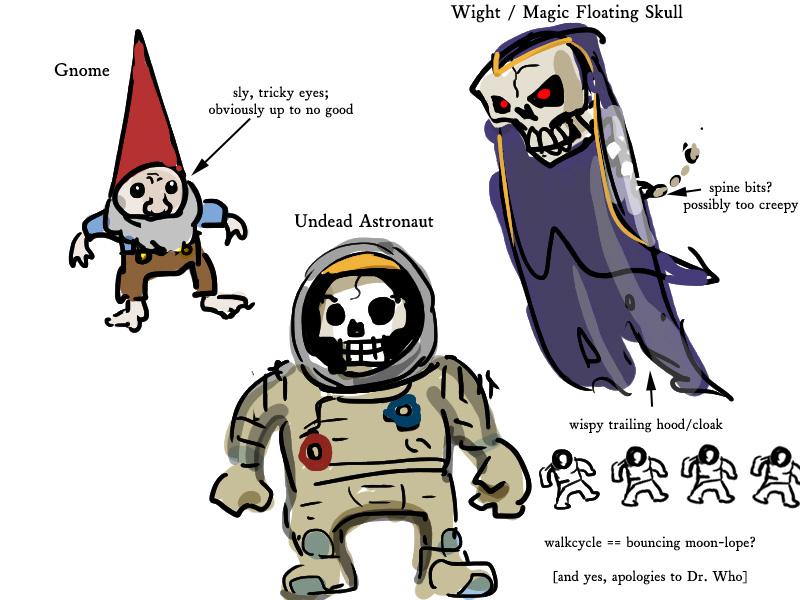
Monster concepts I made for Dungeons of Dredmor expansion packs. I'm pretty sure these all went into Realm of the Diggle Gods.
2012 August 1: expansion #3, Conquest of the Wizardlands
The third expansion came out two months later. It was our best yet, adding (as noted) features that players new and old would experience throughout the entire game experience. Our game design was tighter, though still charmingly maximalist (a lesser critic might use the word "sloppy", but we're in good company here).
The Dredmor content production was a well oiled machine. My art was getting much better, and I could crank out skills and increasingly sophisticated game content based on the features that had been built up by the code team. We had an excellent animator filling the gap in my skillset cranking out new monsters, sprites, and even the occasional illustration when the need arose. Gaslamp Games could have done more expansions and done quite well for itself. But we wanted more, more, more.
I don't have a lot to say about the expansion itself, I think. It went well.
We were simply getting better at making games and scaling up our business. Design and planning became more intentional. I was successfully wrangling a handful of contractors and business partners - animation, rebranding, web design and development, printing, merchandise. Nicholas was working with several contracted coders and looked ready to build a programming team.
If you wondered why we would think we could set our minds to an ambitious project and succeed, well, this is why. We were also riding on a string of successes and great PR. We received an interview request from a games site or magazine or podcast once a week or more. We were getting interest from larger business contacts, including publishers. For a short couple years Gaslamp Games was one of the golden indies of the 2010s.
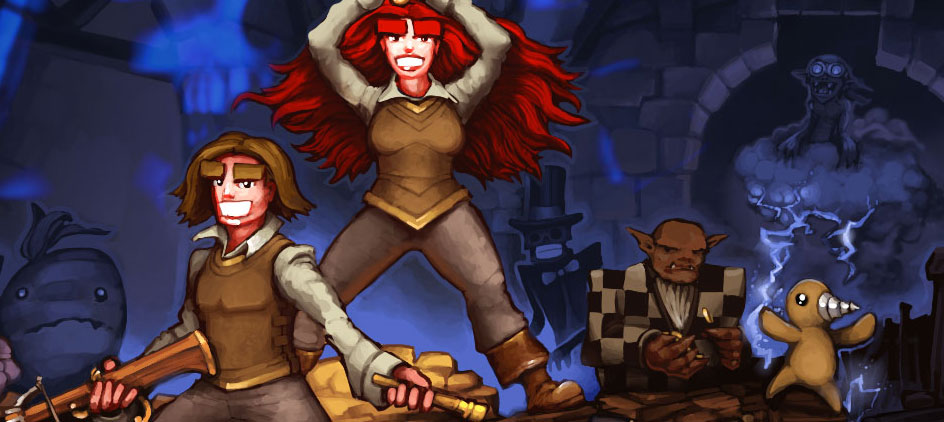
Conquest of the Wizardlands title painting, based off the famous Star Wars poster (to continue from the first Dredmor title being based off the classic DOOM boxart). Click for the full sized image.
Project Odin was starting to gather steam (har). By this point I'd hired an environment artist, Sean, and was looking for additional art team members (more on how I made an ass of myself doing this in the next piece). I'm pretty sure Nicholas was talking to people to build a code team, and of course Daniel was making sure everything and everyone was moving in the right direction, finding a PR representative, additional funding opportunities and tax breaks.
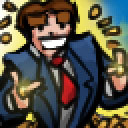
(You wouldn't believe how much Canada will subsidize anything resembling a "tech industry". Large game companies in this country only pay for a fraction of most developers salaries. I find it difficult to express how much this feels like the political economy is rigged to benefit those who already control enormous amounts of wealth, and to forgive them wasting enormous amounts of money with almost no oversight, but: I'll get into more of that in the last part of this series.)
(... Were that it were so easy for small and struggling developers who can't afford lawyers and accountants 'eh.)
2012 August 30: Gaslamp Games at PAX 2012
Gaslamp Games paid to bring the entire company, employees and contractors alike, to Seattle for Penny Arcade Expo (PAX) 2012. We'd run a booth to promote Dungeons of Dredmor and its expansion packs, and while we were at it meet with media and business contacts. Valve was there and we wanted to be close with them for our next project.
And there were the fans.
Have you ever had fans? It's a bizarre phenomenon. And all the more, because I don't think my brain is wired for that scene (or much of any scene, come to think of it). People would come up to me and would say "Thank you for making this game, it's brilliant!" and I couldn't help but say "Thank you for buying the game, we'd be nowhere without you!" I did drawings of random diggles for people who showed up at the booth, sometimes in a notebook they had, sometimes on a pad of paper I brought. That was fun. And a relief, because I didn't know what the hell to say to anyone besides "thanks", so I could always escape from the interaction by drawing them a picture of a diggle.
And yet. Intellectually one can identify the inherent alienation of where this relationship can go. The ego can inflate and hit the ugliness of fanatic fandom meeting disappointment or the confused shock of who one of us really is against the image that's been built. None of this happened at this PAX, but the power of it is frightening.
Could you imagine being actually famous and doing this all the time? It'd be hell.
* * *
At this event and others I would be approached by young women, art students looking for jobs. They'd ask to show their portfolios or get a "portfolio review" or something. I'd never done a portfolio review from either side of the equation, so I wasn't quite sure what this was, though I'm always happy to try to give constructive feedback if someone asks.
Now if you're thinking that if a man in my position was an unscrupulous creep and approached by lots of young women who needed jobs, connections, and approval, well. I think a lot of men in the games industry have been unscupulous creeps in this situation. I should say, I believe these women were acting in good faith on the advice of their instructors to try to network into an industry that is historically hostile to women's involvement. It's difficult, it's awkward, and you're thrown into it with no idea how it's supposed to work.
I'm not sure what else to say. It was weird for me, but that's all it was for me. It makes my heart sink to hear the stories of harrassment and abuse of power in this industry. For what little time I had as someone of a little influence at Gaslamp Games, for all of my own and my partners failures, I am proud that we all tried to make a place for our employees and fans that was better than that.
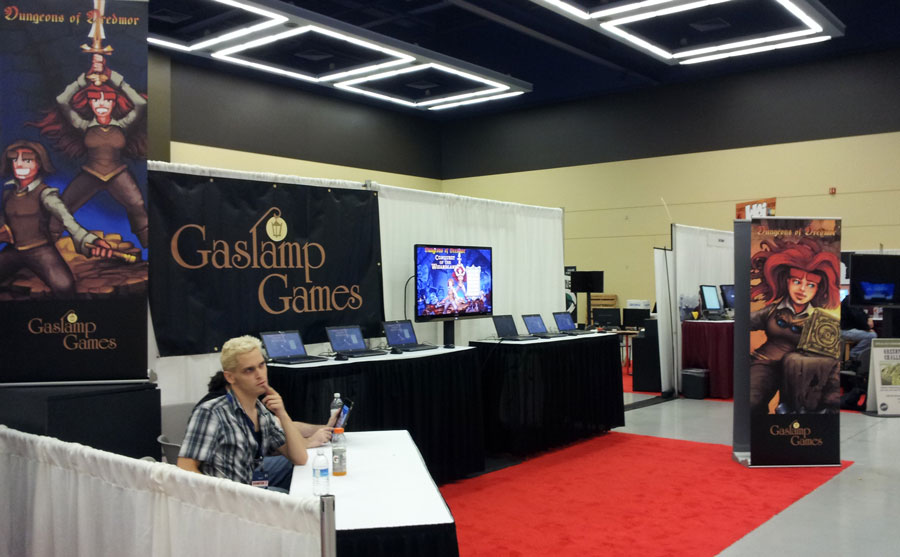
Here's me at the Gaslamp Games booth at PAX 2012, before the floor opened for the day.
Anyway. I had to talk to a lot of people and project some kind of image of myself. It was socially exhausting for my introverted self, and the weirdness of power/prestige dynamics always throws my brain for a loop. But we had the whole company there, so making sure two people were at the booth at all times left everyone else plenty of time to take in the sights and do whatever else they felt like.
(I did miss Ron Gilbert, of Monkey Island fame, coming by our booth. That's a huge regret on my part. There, maybe I do have a little bit of fan-brain in me.)
We met lots of press as well. I'll protect the innocent (up to a point, ha-ha!), but Gaslamp Games was a hot item. Press wanted to talk to these brilliant indie game devs. You know, like in that Indie Game: The Movie that had come out in early 2012! (Admission: I have not seen the movie. There's nothing I want to see less.)
Nicholas always put on a good performance for these sorts of things; it was really his element and he took tremendous enjoyment in being the center of attention and playing the character of "eccentric gentleman of computer wizardry". Daniel grounded him to the best of his ability. I was always intensely uncomfortable in front of a camera. I recall one crew from IGN or something tried to set me up for an interview (the other guy at the booth was someone like Derek, our web guy, so not someone they wanted to interview). I flubbed this interview so completely that they kinda trailed off and politely said they had "everything they needed" and left.
* * *
Let me tell an extended anecdote to give a feel for those times.
So: the three Gaslamp directors received invites to the Mojang party. This was before, you know, that guy ran off with his two billion dollars and turned into a complete crank. As far as I know he wasn't there anyway.
We show up to the VIP line, show our passes. The event was organized by some tech event organizer - Seattle, right? - and in we go with our fellow predominantly white male tech-nerds. The event space is huge, a tented-over block-sized parking lot. AVICII (RIP) was headlining a huge dance party. The VIP space was elevated and had several open bars. I remember standing there with Evan of PC Gamer and looking out over the huge crowd dancing to the music. I said something like "Indie games, man." and shook my head.
(Oh yeah, the dude who did the music for Minecraft was there. He was fairly drunk and definitely a hugger. Nice guy.)
There were also (here we go again) a disconcerting number of attractive younger women in attendance who turned out, in a very minor entirely online scandal, to have been from the roster of a modelling agency who were given free tickets/hired to be there. It is, I am told, a common practice for modelling agencies to be hired to populate events like this. Mojang later said they had no idea, and it was the event organizer who set this up. This was clearly not an uncommon practice and I imagine it still happens. Or would if we weren't in the middle of a plague, of course.
Well, we grabbed some drinks. Nicholas' game at the time was to ask the bartender to give us what they think Kanye West would have on the occasion. Mostly they'd just shrug and pour some straight bourbon; everything else had run out besides in this case, so that's what we got. Nicholas disappeared to schmooze so Daniel and I enjoyed a couple songs on the dance floor until someone had a seizure and had to get carted off by EMTs. Outside, a random dude lingering in the parkling lot offered us mushrooms.
No, not like that. Foraged wild mushrooms. In a parking lot in downtown Seattle at 2am in the morning.
Indie games, man. Indie games.
Part 3b will be "What did it all mean, if anything?"
Return to blog index